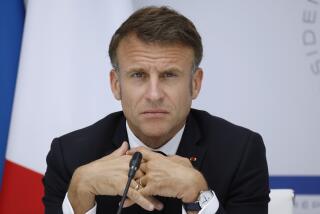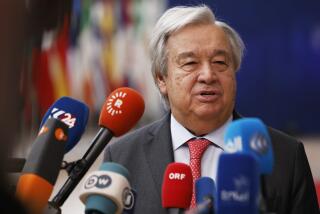World finance leaders press Europe to do more on debt crisis
WASHINGTON -- One by one, the world’s top finance officials Saturday pressed Europe to do more to shore up its debt problems, warning that the global recovery remains fragile and that the Eurozone shouldn’t relax now that it has secured more resources to fight the crisis.
In statements issued a day after officials announced commitments to boost the International Monetary Fund’s emergency lending capacity by $430 billion, finance ministers meeting here called on euro-area policymakers to strengthen their banks and continue to make economic reforms that would lead to stronger and more balanced growth.
U.S. Treasury Secretary Timothy F. Geithner, while welcoming the new commitments to bolster the IMF’s firepower, said: “The success of the next phase of the crisis response will hinge on Europe’s willingness and ability, together with the European Central Bank, to apply its tools ... flexibly and aggressively to support countries as they implement reforms.”
Japan’s finance minister, Jun Azumi, said policymakers “should avoid slipping into complacency and exploit the temporary breathing space [to build] … resilient economic, fiscal and financial systems that are needed to forestall future crises.”
Earlier in the week, Japan pledged to contribute $60 billion to expand the IMF’s so-called firewall to contain the Eurozone’s long-running crisis. That was followed by smaller commitments from a number of other countries, as well as conditional pledges from still others. China, Russia, Brazil and India also were expected to contribute. The euro area previously had pledged to increase its support by $200 billion, and the U.S. had not committed to offer any additional funds.
The amount of new commitments, although less than the $500 billion initially sought, was still the second-largest in IMF history, experts said, and is likely to give investors greater confidence that the problems can be contained.
“It has to be seen as a good thing because it reinforces the firewall framework,” said Nicolas Veron, a scholar with Bruegel, a research institute in Brussels.
At the same time, Veron and other analysts noted that a bigger IMF war chest, while helpful, doesn’t address the underlying economic and political problems and imbalances that lie at the heart of the euro crisis.
The IMF’s governing panel said nearly as much Saturday in urging the euro area to undertake “bold structural reforms” that would be “crucial to boosting confidence and productivity, facilitating rebalancing within the monetary union, and promoting strong and balanced growth.”
Brazil’s finance minister, Guido Mantega, went further, criticizing some European countries for tightening up their spending when, he said, they should be doing the opposite to spur global growth.
“Germany and other Northern European countries may be able to adopt more flexible fiscal policies,” he said. “This would not only help global demand but also facilitate the rebalancing within the euro area.”
Germany’s finance minister, Wolfgang Schauble, said his country was committed to consolidating public finances.
RELATED:
IMF forecast: A ‘very fragile’ global recovery
IMF raises $430 billion, boosting resources for troubled nations
IMF’s Lagarde: All of the focus should be on achieving stability
More to Read
Inside the business of entertainment
The Wide Shot brings you news, analysis and insights on everything from streaming wars to production — and what it all means for the future.
You may occasionally receive promotional content from the Los Angeles Times.











